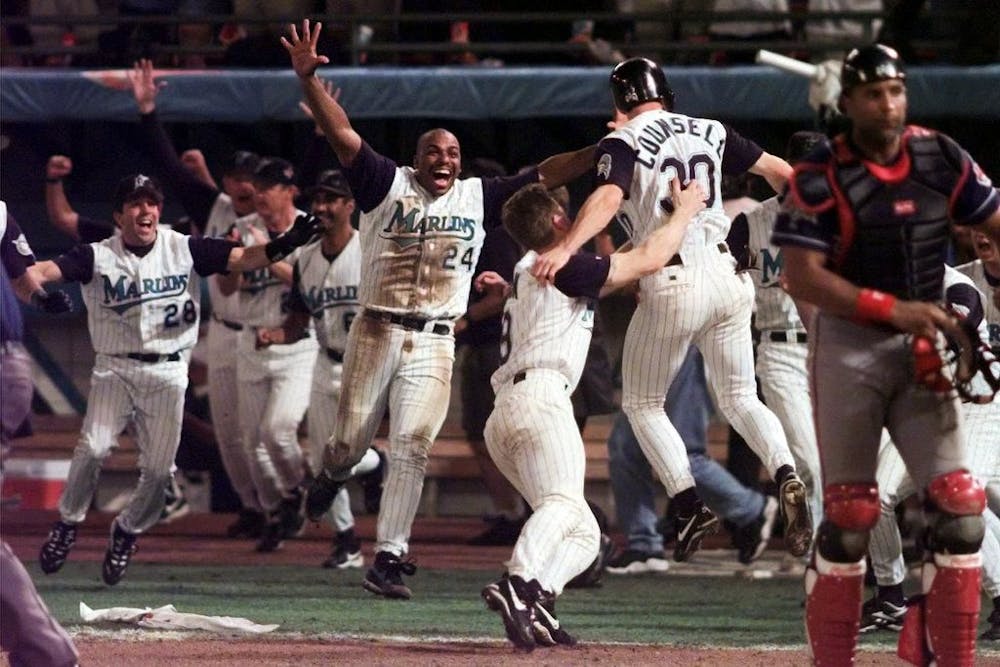It was nearly dusk when I arrived, stepped out of my dad’s Nissan Sentra and inhaled the scent of high expectations.
Grill smoke and the aroma of seared meat filled the air as fans, fresh off an opening day victory, tailgated in the parking lot. A few hundred feet away, the then-Florida Marlins were preparing to play the then-Montreal Expos in what was then Pro Player Stadium. It was game two of a three-game series to open the season, and not just any season. It was the 2004 season, and the Marlins had just won the World Series.
Of course, besides the World Series part, I knew none of that. Only years later have I learned to recognize that fanbase optimism can be measured in pounds of food cooked at tailgates — I learned that quickly once the Marlins started sucking — and I had no idea what a three-game series was or who the Montreal Expos were. It was, after all, my first baseball game.
The next thing I remember is walking up the spiral ramp to the second level of the stadium and emerging into the stadium’s interior through a tunnel on the first base side. At first I saw orange — nothing but orange — as the old stadium’s infamous neon seats revealed themselves for the first of many times. Next I saw the “teal monster,” the giant scoreboard that showed scores from across Major League Baseball in left field. Of course back then, abbreviations like NYM, NYY, TOR, STL and CIN were as foreign to me as acronyms written in Korean.
I remember Brad Penny pitched that day, and I remember the Marlins lost in a close game. That’s pretty much all I remember, which admittedly isn’t much. Yet I still view that day and that game as one of the formative moments of my young life. That, it turned out, was the beginning of my love of sports.
I soon started following football in addition to baseball, and while I grew up watching Florida football with my dad, himself a UF alum, I never knew the players or followed the team. Suddenly that changed.
I never really asked why until college when I started working at the Alligator, where I’ve written several columns about how sports are trivial compared to real problems like cancer or war or racial injustice. I still stand by those thoughts, but with my time at the Alligator ending next week, I wanted to try and explain why — even though there are times to put sports aside and even though I find much of sports reporting to be contrived and meaningless — I chose to write about them in the first place.
The answer starts with a fancy philosophical term called metaphysics. My apologies to any philosophy professors/majors who read this because surely my explanation will fall short, but metaphysics basically tries to make sense of reality. It asks questions about principles and existence, and it has implications in sports.
That’s because there’s a fundamental metaphysical question related to sports: Are human beings, for some reason, drawn to competition as part of our nature? And I believe the answer to that question is a clear yes.
Whether the ancient Greek olympics, the Roman gladiators or today’s NFL, humans seem to generally be drawn to competition as a distraction. There are other forms of distraction to be sure — one of my best friends, for example, prefers being entertained by esports and Dungeons and Dragons — but sports are a classic way to escape from our everyday lives and momentarily bask in pure emotion. Which, like sleeping or communicating, is something most humans need to do.
Something else humans generally need are relationships. Sports help build them. My dad and I still bond to this day over Florida football and Marlins baseball, even if we can’t watch games together. And are there other ways to forge relationships? Of course. But sports are an easy, passive way to do so.
I’ve definitely lessened my leisurely sports consumption since I started writing about them — ironic, I know — but it’s not too hard to think back to four or five years ago when my idea of a fun Friday night was schlepping over to Marlins Park to watch a game with my fellow baseball-loving friend.
We’d watch the game. Talk about the game. When our team played poorly, it left us with our heads hung feeling defeated, even though we’d done nothing ourselves. When our team did well, we’d leave feeling a rush of ecstasy. And when the team experienced sustained success, it made our lives feel a little better. Notice a common word in all three of those instances?
Yes, feeling — that’s what sports offer. And few other parts of our daily lives can.
Ethan Bauer is a sports writer. Follow him on Twitter @ebaueri and contact him at ebauer@alligator.org.
The then-Florida Marlins won the 2003 World Series over Cleveland.






